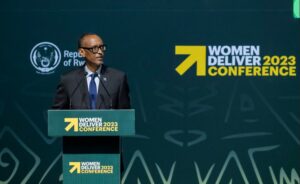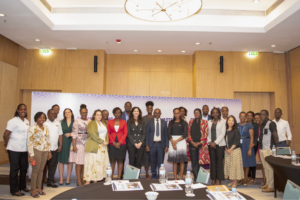When I visited the Bandebereho intervention in Musanze last month, I observed that transformation is possible to challenge gender dynamics at the household level.
Our Story
The Rwandan government has actively championed gender equality through various policy and government initiatives. A recent example was the opening remarks given by President Paul Kagame at the opening ceremony of the Women Deliver conference. President Kagame said:
“We must challenge ourselves to do things differently, and with a sense of urgency.
Commitments, which are not followed by action, cannot fulfill our promise to build a more just, equitable, and prosperous future for the generations that follow us.
We also invest in programs to engage men at the community level, about the importance of sharing child care responsibilities, and preventing domestic violence.”

The Bandebereho program is the key example of the programs the President was referring to. The program, highly regarded by the Rwanda Parliament, showcases Rwanda’s commitment to dismantling gender-based disparities. In collaboration with the Ministry of Gender Family Promotion and the Rwanda Biomedical Center, the program aims to challenge traditional gender norms, empowering women in decision-making, community leadership, and economic self-sufficiency. At a dissemination event for the program, the Minister of Gender and Family promotion, Prof. Bayisenge Jeannette said:
“When I visited the Bandeberehero intervention in Musanze last month, I observed that transformation is possible to challenge gender dynamics at the household level.”

At the core of the government’s commitment is the Gender Policy, which acknowledges the disproportionate burden of unpaid care work on women. This policy advocates for the equitable distribution of household and care responsibilities among family members, fostering a more balanced society.
To reinforce its commitment, the Rwandan government has launched social protection programs, including Vision 2020 and the Umurenge Program (VUP). These programs provide direct cash transfers to vulnerable households, alleviating poverty and mitigating the disproportionate impact of unpaid care work on women, emphasizing that economic security is not gender-exclusive.
In the realm of Early Childhood Development (ECD), Rwanda has introduced a comprehensive policy recognizing the pivotal role of parents and caregivers in providing quality care to young children. By ensuring equitable access to ECD services, the government aims to alleviate the caregiving burden on women and enhance children’s prospects.
Rwanda has also made significant strides in parental leave policies. Paid maternity leave supports working mothers in caring for their newborns, and the recent introduction of 7 days of paternity leave emphasizes the government’s commitment to balanced responsibilities at home. There’s an ongoing proposal to extend paternity leave to a month.
In a strong commitment to gender equality, the Rwandan government has integrated gender budgeting principles into its national planning and budgeting processes with the annual Gender Budget Statement. This approach ensures that considerations, including the impact of unpaid care work, are systematically incorporated into resource allocation and policy formulation, promoting a gender-sensitive governance approach.
Rwanda’s journey towards gender equality is characterized by resilience and determination, transcending borders and inspiring hope globally. The government’s dedication, as demonstrated through the Bandebereho program, Gender Policy, social protection initiatives, Early Childhood Development policies, parental leave policies, and efforts to combat gender-based violence, serves as a beacon of hope. With such unwavering dedication to gender equality, Rwanda’s future holds the promise of a brighter and more equitable world for all its citizens.


